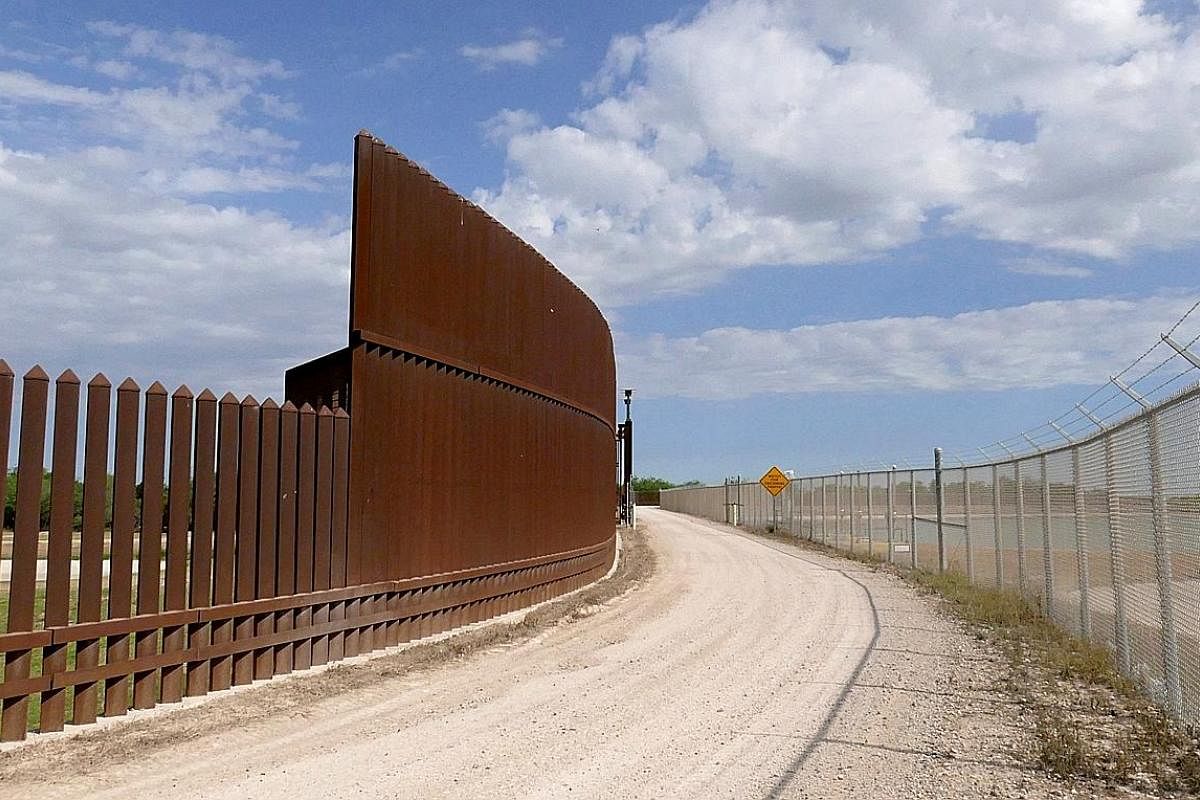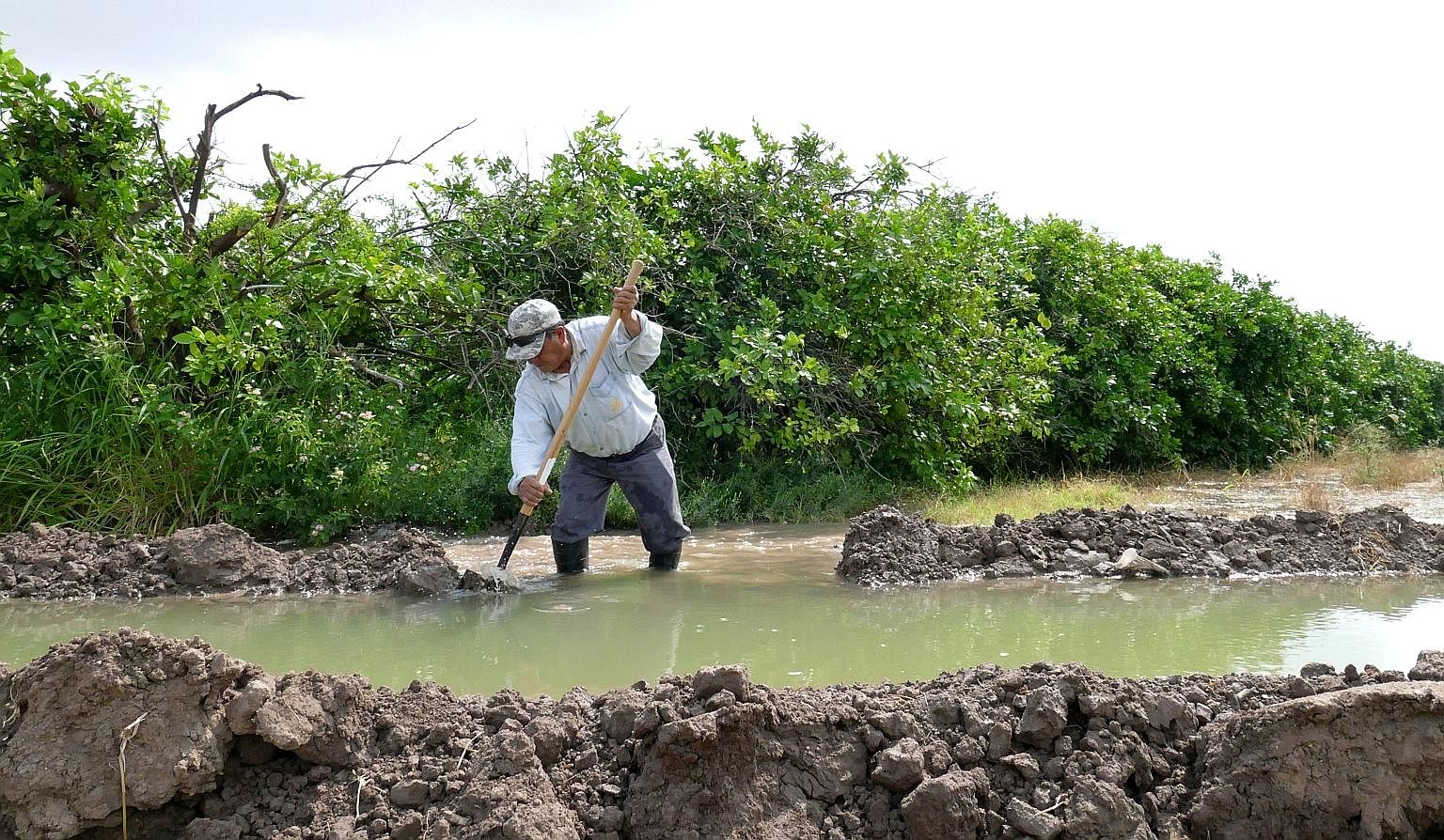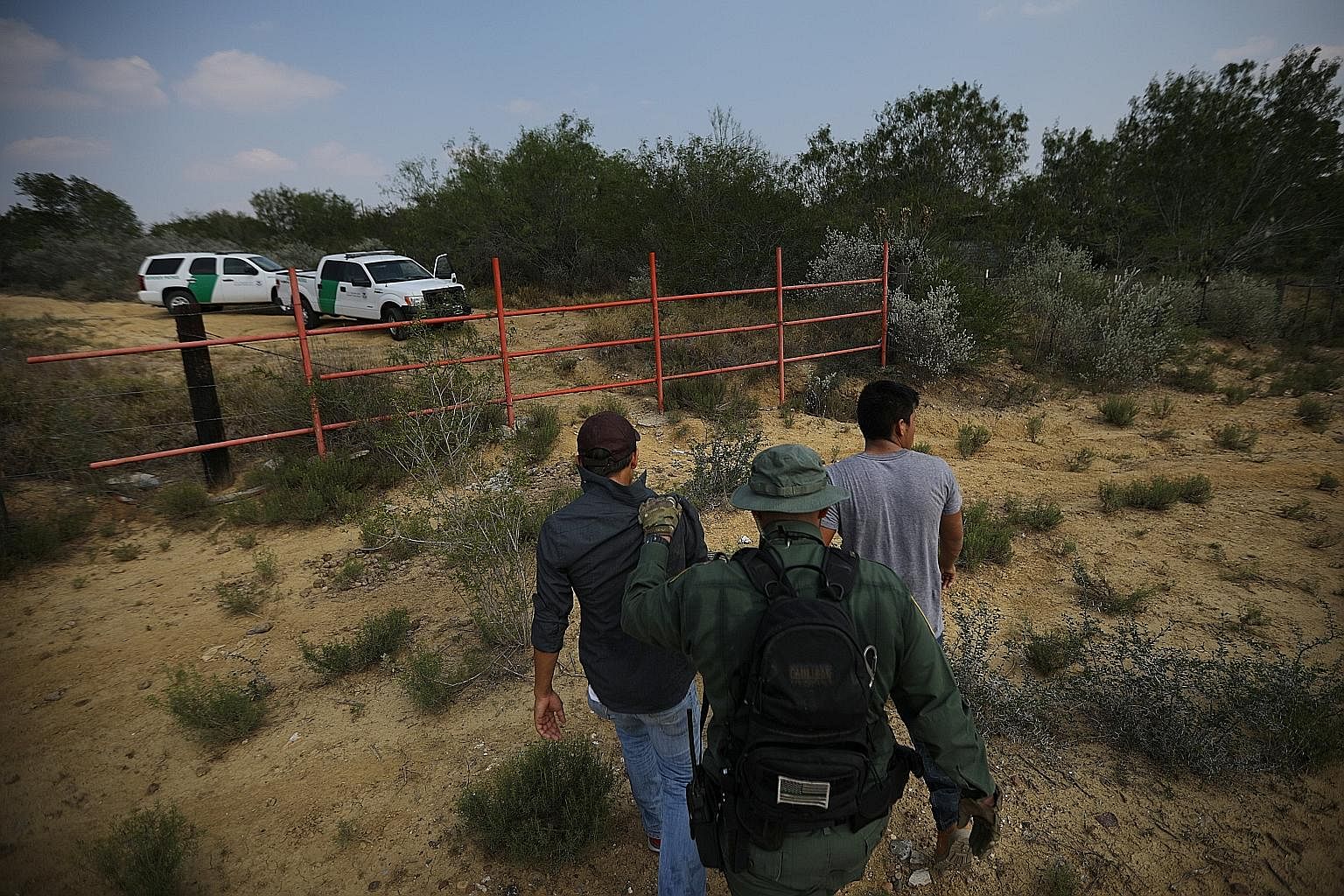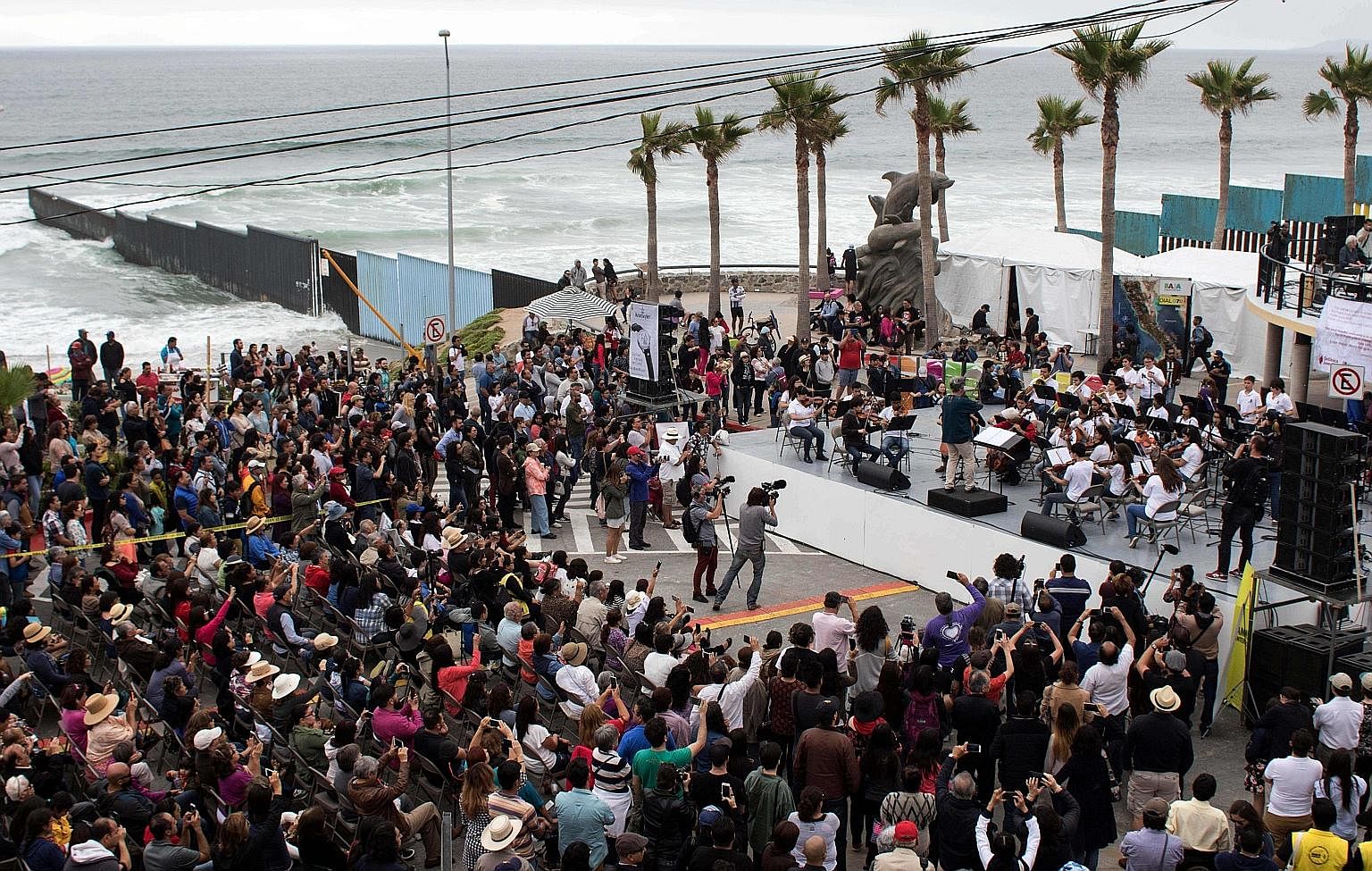WORLD FOCUS
Donald Trump's wall project not sitting well on the border
Beyond impact on US labour force, residents say wall will dampen close ties with Mexico
Trump administration’s tough stance on immigration and its insistence
on building an expensive and logistically problematic wall.

Standing in an irrigation ditch in a grapefruit field under a hot Texas sky in the Rio Grande Valley, 62-year-old Navor Carpio Chavez pauses, leaning on his shovel, to mop the sweat from his forehead.
His native Mexico is barely a kilometre away across the Rio Grande river, but it has been 35 years since he started working in the United States, on a citrus farm in southern California. And he now has a US green card.
The US depends on men such as Mr Chavez, who, according to the Department of Labour, is one of 27 million foreign-born people in the labour force - of which Hispanics account for 48.3 per cent. As many as 11 million are undocumented - a euphemism for "illegal".
President Donald Trump's administration's hard line on immigration, and its insistence on building a wall on the Mexican border, has triggered fear and apprehension.
Farmers are already complaining of a shortage of workers as fewer immigrants come to the US amid the tough rhetoric and a renewed crackdown on undocumented immigrants since Mr Trump took office.
In April, the Agriculture Workforce Coalition industry group warned in a letter to the President that the nation's US$985 billion (S$1.4 trillion) agriculture industry was "threatened by the lack of a reliable, stable and legal workforce".
Arrests of undocumented immigrants have risen by 38 per cent overall in the first 100 days after President Trump issued an executive order on Jan 25 to crack down on undocumented migrants, over the same period last year, US Immigration and Customs Enforcement data shows. In Texas, a new law in force since April 27 allows the police to ask during routine stops whether a person is in the US legally.
The real impact of the wall is in the message it sends, say locals who live near the border in Texas.
It will cloud a close relationship and discourage people from going to the US to work and help keep economic engines such as Texas and California going. The two states together contribute about 23 per cent of the US' gross domestic product.
"The agriculture industry alone self-reports that 50 per cent of its workers are undocumented, which probably means 75 per cent," Mr Joaquin Castro, a Democratic Party representative from San Antonio, Texas, told The Straits Times.
Without these workers, the industry would collapse.
"They cannot work without Mexicans," Mr Chavez said with a chuckle, as water from the Rio Grande runs around his boots. "Black people don't like to work in farms. White people only want to work in air-conditioning, pushing pencils, working on computers."
The lesson hit hard in Georgia in 2011, when the state cracked down and deported undocumented workers. The result: an estimated US$140 million (S$194 million) in agricultural losses as crops rotted in fields with nobody to harvest them.
"Though the state had enough unemployed residents, nobody wanted to work. It's too damn hard," 81-year-old Glen Gernentz, a Texan native and manager of the farm where Mr Chavez was working, told The Straits Times.
Mr Trump wants to start his wall in the Rio Grande Valley. His 2018 budget asks Congress for 51km of new wall, and 45km of a levee that would double as a wall, at a cost of US$1.6 billion.
"We are absolutely dead serious about the wall," director of the government's Office of Management and Budget Mick Mulvaney told journalists last month.

Ironically, surveys show that the idea of the wall is most unpopular in the very states that border Mexico.
The problem the wall is meant to address has been reduced.
Already, locals say reports in March that the Department of Homeland Security may separate mothers from their children if they crossed the border illegally as a deterrent, had a chilling effect.
"Illegal border crossing is now down to virtually zero," Mr Gilberto Hinojosa, a Brownsville lawyer and chair of the Texas Democratic Party, told The Straits Times.
The greater impact of the wall will be symbolic.
"The border cities have worked really hard to build up working trade relationships," Brownsville resident Mary Lou MacNelly, 55, who used to work for the local county office, told The Straits Times. "People come back and forth every day, working, buying, visiting family, contributing to each other's economy."
A woman from Mexico had cared for her invalid mother for five years, she said, coming over to the US every Monday.
Ms MacNelly said: "She stayed at my mother's, took care of her, fed her, clothed her, bathed her, did everything I wanted, and I paid her US$175 a week, cash. She was happy, I was happy, my mother was cared for. Could I do that now? No.
"Before, everybody was friendlier and more open. Now they look at each other with suspicion."
The wall is a 19th century solution to a 21st century problem, Mr Castro said. "If you think of the technology we have in place to monitor the border, many people are dumbfounded as to why you would build a big wall," he told The Straits Times.
"There are a lot of Republicans down there who are border security hawks, but still disagree with building a wall."

The answer, he maintained, is immigration reform - tightening rules, but also providing a clear path to legalisation, rather than deporting or turning people away.
Republican strategist and commentator Evan Siegfried wrote in February that Mr Trump was right to focus on border security, but an estimated 40 per cent of illegal aliens entered the US legally and overstayed their visas.
"A wall would do nothing about those overstayers. Mr Trump would be prudent to move away from a physical wall to one that is 'virtual' or 'electronic'," he wrote.
Certainly, the border has, over the years, seen millions crossing it to migrate to the US. In 2014, waves of desperate people, many of them families with little children, came across, fleeing countries such as El Salvador where poverty, corruption and violence is endemic. The movement is facilitated by organised traffickers.
Mr Trump ignited the current backlash, speaking of criminal illegal immigrants and getting thousands of people to chant "Build the Wall! Build the Wall!" at his rallies.
"He did it to rile people up," admitted Mrs Pamela Taylor, an 88-year- old Trump supporter who has lived in Brownsville, Texas, a short walk from the border, since 1947. She still supports Mr Trump as an agent of change, but even she believes the wall will solve nothing.

Currently, more than two dozen busy overland ports of entry from Mexico into the US collectively see a trade volume of US$1.4 billion a day.
To residents in the fertile valley of the Rio Grande, building a wall on this border would be an expensive folly, ruining the symbiotic relationship with Mexico.
"It's a complete waste of time and taxpayers' money," said Mr Johnny Villareal, 40, who manages a restaurant in Rio Grande City. "The only people who support the wall idea are those that don't live here."
VIDEO: Whom the border wall affects str.sg/trumpwall
Join ST's Telegram channel and get the latest breaking news delivered to you.
A version of this article appeared in the print edition of The Straits Times on June 13, 2017, with the headline Donald Trump's wall project not sitting well on the border. Subscribe

